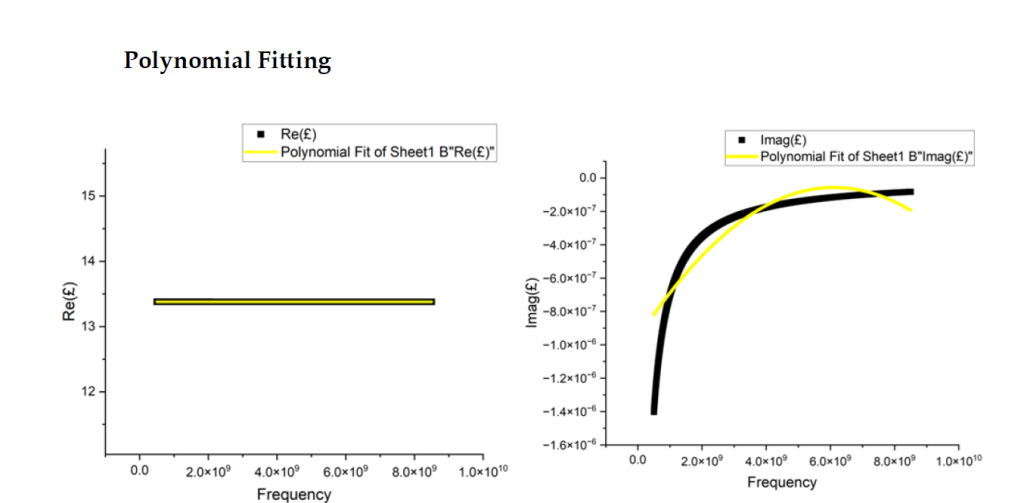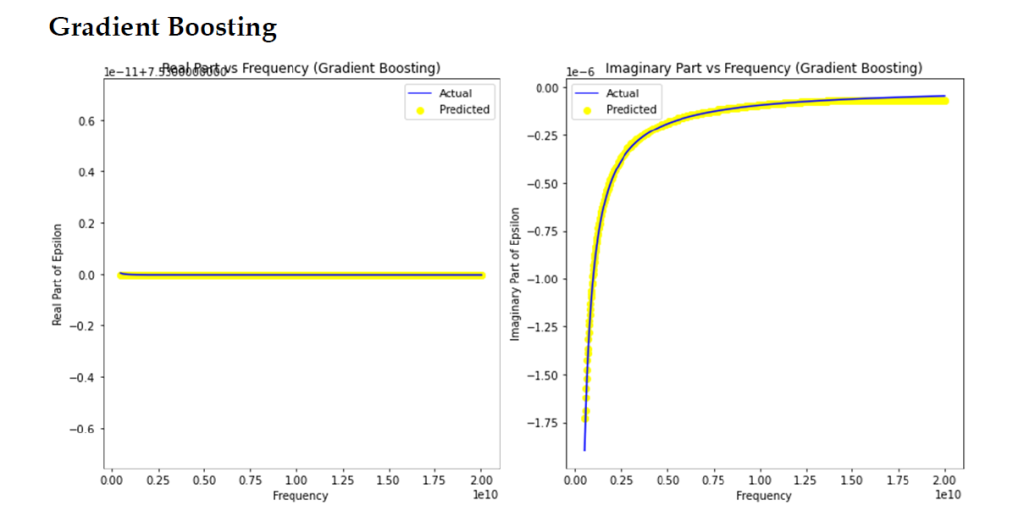India’s Tryst with Globalization: A Study on Growth and Poverty Nexus
The poor in India has continuous future benefits from globalization through improved healthcare – A new research from SRM University-AP economists
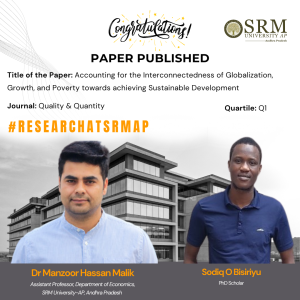 In a groundbreaking study, Dr. Manzoor H. Malik, an Assistant Professor in the Department of Economics, and Sodiq O. Bisiriyu, a Research Scholar, have developed a comprehensive framework known as the globalization-growth-poverty (GPP) triangular nexus.
In a groundbreaking study, Dr. Manzoor H. Malik, an Assistant Professor in the Department of Economics, and Sodiq O. Bisiriyu, a Research Scholar, have developed a comprehensive framework known as the globalization-growth-poverty (GPP) triangular nexus.
This innovative model examines the interplay between globalisation waves, economic growth trends, and their collective impact on poverty reduction in India, aligning with the nation’s commitment to achieving Goal 1 of the Sustainable Development Goals.
The researchers used three different indicators of poverty, encompassing the monetary and non-monetary constructs. The research controls for the impact of government development spending and domestic investment in the GPP nexus. The result of the research validates the significant globalization-led growth hypothesis in the short run and establishes the existence of the GPP triangular nexus in India. Additionally, the researchers found positive association of globalization and growth with monetary and non-monetary poverty measures in the short-run while the impact on monetary measure in the long-run is ambiguous.
Finally, the results offer significant insight into the impact of government development spending and domestic investment on poverty. The results prove that government development expenditure in India is detrimental to non-monetary poverty while domestic investment have insignificant impact on all poverty constructs.
From policy perspective, the researcher said, “the short-run validation of globalization-led growth hypothesis for India is challenging and calls for government broad-based framework to tackle impediments of long-term globalization-led growth and monetary poverty benefits”. They emphasized that only sustained long-term growth can accelerate the vision of India as stated in “Viksit Bharat 2047” agenda. Published in the esteemed ‘Quality & Quantity’ journal by Springer, with an impact factor of 2.87, this study provides valuable insights for academics, practitioners, and policymakers. It sheds light on the complex dynamics shaping contemporary socio-economic environments and offers evidence-based analysis supported by an extensive review of relevant literature.
- Published in Departmental News, Economics Current Happenings, News, Research News
Professor and Scholar Duo filed Patent for Employee Productivity Enhancement System
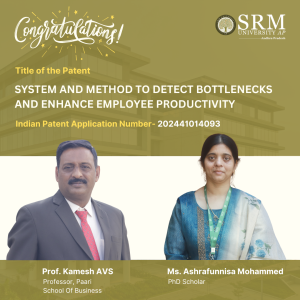 In a significant development, Prof. Kamesh AVS, Professor at Paari School of Business, along with his PhD Scholar, Ms. Ashrafunnisa Mohammed, has successfully published and filed a groundbreaking patent titled “SYSTEM AND METHOD TO DETECT BOTTLENECKS AND ENHANCE EMPLOYEE PRODUCTIVITY” with the Application Number: 202441014093 A in the Patent Office Journal.
In a significant development, Prof. Kamesh AVS, Professor at Paari School of Business, along with his PhD Scholar, Ms. Ashrafunnisa Mohammed, has successfully published and filed a groundbreaking patent titled “SYSTEM AND METHOD TO DETECT BOTTLENECKS AND ENHANCE EMPLOYEE PRODUCTIVITY” with the Application Number: 202441014093 A in the Patent Office Journal.
This pioneering system aims to revolutionise the way organisations detect and alleviate bottlenecks within their operations, consequently boosting overall employee productivity. The patent’s unique approach and methodology signify a remarkable stride towards fostering efficiency and performance in the workplace. Prof. Kamesh AVS and Ms. Ashrafunnisa Mohammed’s collaborative effort underscores their commitment to innovation and research excellence. Their accomplishment not only reflects their expertise in the field but also highlights the spirit of ingenuity and problem-solving that drives academia at Paari School of Business.
The SRM AP community extends its heartfelt congratulations to Prof. Kamesh AVS and Ms Ashrafunnisa Mohammed on this remarkable achievement and eagerly anticipates the positive impact their invention will have on the realm of employee productivity and operational efficiency.
Abstract of the Research
SYSTEM AND METHOD TO DETECT BOTTLENECKS AND ENHANCE EMPLOYEE PRODUCTIVITY
The present disclosure relates to a system for detecting bottlenecks and enhancing employee productivity. The system broadly includes an input module (106), a pre-processing module (108), a segmentation module (110), a feature selection module (112), a feature extraction module (114), a data training module (116), and a classification module (118). The system also consists of a data repository (102), a processor (104), and an evaluation module (120). The present disclosure aims to examine counterproductive work behaviors of employees through the effort-reward imbalance model by considering dark triad traits as moderators. The dark triad traits can indulge the employees more in unethical practices in organizations and one among those traits is Narcissism which negatively affects counterproductive work behaviors. Organizations can predict the Dark Triad traits in individuals, and they can avoid unethical practices in organizations and counterproductive work behaviors.
Explanation of the Research in Layperson’s Terms:
The present process aims to examine counterproductive work behaviors through the effort-reward imbalance model by taking into consideration Dark triad traits as moderators. The Dark Triad traits can indulge the employees more in unethical practices in organizations and one among those traits is Narcissism which negatively affects counterproductive work behaviors. Organizations can predict the Dark Triad traits in individuals, and they can avoid unethical practices in organizations and can avoid counterproductive work behaviors. There is a notable knowledge gap concerning the moderating role of Dark Triad traits in the relationship between efforts and rewards imbalance and counterproductive work behaviors, even though there is existing research on both the association between Dark Triad traits and counterproductive work behaviors and the relationship between efforts and rewards imbalance and counterproductive work behaviors.
Practical Implementation or Social Implications Associated with the Research:
• The Invention aims at identifying and eliminating the consequences of the Dark Triad Traits while performing Human Resources Practices like Recruitment, Training and Development, Performance Analysis, and Compensation and Reward Management system.
• The Invention either weakens or eliminates the Counter Productive work behaviors as a potential consequence of springing up of Dark Triad traits during the execution of various Human Resource practices in the organizations and this leads to achieving the estimated Organizational Productivity as per the strategy.
• Organizations can identify the impact of the Dark triad traits on employees and take steps to reduce the stress that leads to unproductive work behaviors.
• Organizations can eliminate the job stressors which are seen as the main sources of
• Counterproductive work behaviors can indicate the Dark triad traits’ influence on individuals.
• Management should investigate the causes of rudeness in the workplace to improve morale and productivity.
• During the hiring process, management should use a battery of psychological tests to gain insight into candidates’ personalities.
• Management can formulate standard policies to eliminate malicious activities and avoid effort-reward imbalances and counterproductive work behaviors.
• Understanding the causes of counterproductive workplace behavior is vital because it has become a widespread and expensive problem for businesses worldwide.
Future Research Plans
To Incorporate AI and ML tools to identify the Dark Triad traits, thereby enhancing the employee evaluation process and mitigating counterproductive work behaviors within organisations.
- Published in Departmental News, News, Paari Current Happenings, Research News
Innovative Insights: Rupesh Kumar’s Book Unveils Advances in Wireless Technologies
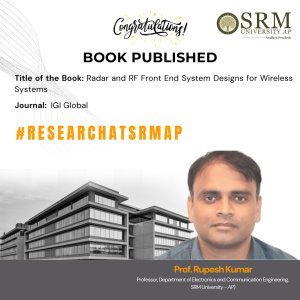 In a remarkable stride for the field of wireless communication, Prof. Rupesh Kumar from the Department of Electronics and Communication Engineering has authored a pivotal book that promises to redefine our understanding of radar and RF systems. The book, entitled “Radar and RF Front End System Designs for Wireless Systems,” is the latest gem in the prestigious “Advances in Wireless Technologies and Telecommunication (AWTT)” series.
In a remarkable stride for the field of wireless communication, Prof. Rupesh Kumar from the Department of Electronics and Communication Engineering has authored a pivotal book that promises to redefine our understanding of radar and RF systems. The book, entitled “Radar and RF Front End System Designs for Wireless Systems,” is the latest gem in the prestigious “Advances in Wireless Technologies and Telecommunication (AWTT)” series.
With his profound expertise, Prof. Kumar navigates through the complexities of designing state-of-the-art front-end systems, offering readers a treasure trove of knowledge that bridges theory and practical application. This book is set to become an essential read for aspiring engineers and seasoned professionals alike, enriching the academic and industry landscape with its innovative approach.
Join us in celebrating Prof. Kumar’s exceptional contribution to the world of electronics and communication engineering. Dive into the depths of this masterful work and emerge with insights that could shape the future of wireless systems.
About the Book:
Radar and RF Front End System Designs for Wireless Systems delves into the intricate world of wireless technologies, particularly focusing on radar and RF front-end systems. The advent of wireless communication has ushered in a new era of connectivity, revolutionising various sectors including healthcare, smart IoT systems, and sensing applications. In this context, the role of RF front-end systems, with their reconfigurable capabilities, has become increasingly vital. The impetus behind this book stems from the remarkable surge in innovation witnessed in RF front-end systems. Researchers and practitioners alike have contributed a plethora of new configurations and design architectures, paving the way for unprecedented advancements in wireless systems. Our aim with this publication is to provide a platform for researchers to explore both theoretical insights and practical applications, thereby facilitating the dissemination of the latest trends and developments in the field. The contents of this book cover a wide spectrum of topics, ranging from RF frontend antenna systems to the impact of artificial intelligence and machine learning in system design. With contributions from experts in academia and industry, readers can expect a comprehensive exploration of radar and antenna system design, modeling, and measurement techniques. We envision this book serving as a valuable resource for students, researchers, scientists, and industry professionals seeking to deepen their understanding of RF front-end antenna and radar system designs. Whether it’s exploring reconfigurable antenna systems for 5G/6G networks, or delving into radar modelling and signal processing techniques, this book offers insights that are both timely and relevant.
Co-author of the Book:
Shilpa Mehta, a co-author of the book, holds a PhD from Auckland University of Technology, New Zealand. Presently, she serves as a Teaching Assistant at AUT, Auckland. Shilpa received the Summer Doctoral Research Scholarship for her PhD work. Her research spans across projects such as Radio Frequency Integrated Circuits, RF front ends, Optimization, Internet of Things, Wireless Communication, Artificial Intelligence, Healthcare, Radars, Software-defined Radios, and Smart Cities.
For the Book Chapter Publication, Click the Link
- Published in Departmental News, ECE NEWS, News, Research News
Exploring the Exciting Potential of 6G Networking
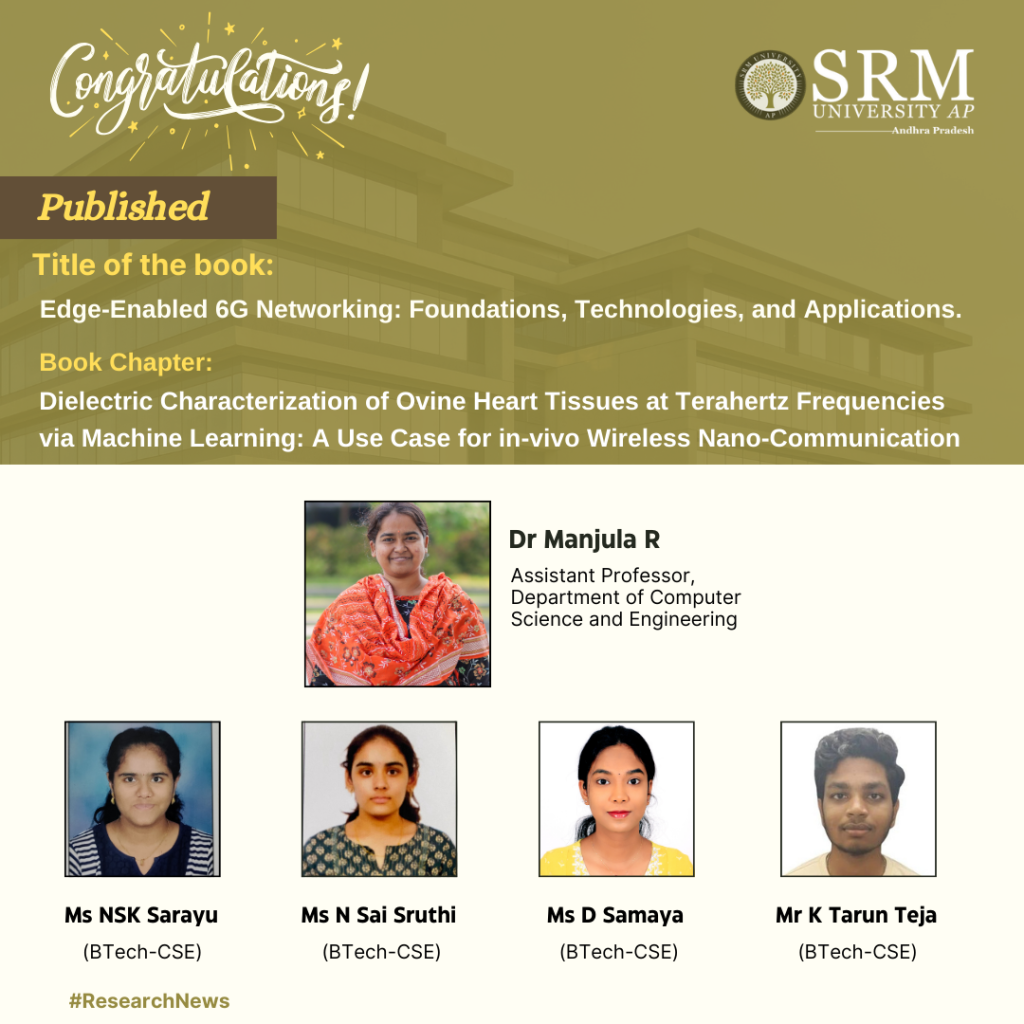
The Department of Computer Science and Engineering is proud to announce the acceptance of the book chapter titled, Dielectric Characterization of Ovine Heart Tissues at Terahertz Frequencies via Machine Learning: A Use Case for in-vivo Wireless Nano-Communication in the book, “Edge-Enabled 6G Networking: Foundations, Technologies, and Applications.” The book chapter by Dr Manjula R and her students, Ms NSK Sarayu, Ms N Sai Sruthi, Ms D Samaya, and Mr K Tarun Teja from the department caters to UG/PG and PhD students, educational institutions, and medical healthcare sectors. Dr Manjula’s research doesn’t just underscore the significance of understanding the dielectric properties of heart tissues but also highlights the transformative potential of machine learning in predicting, diagnosing and offering therapeutic interventions equipped with real-time monitoring capabilities. The research also lays the groundwork for future advancements in this field, facilitating the development of more efficient and reliable in-vivo sensing technologies.
Abstract of the Book Chapter:
A new generation of sensing, processing, and communicating devices at the size of a few cubic micrometers are made possible by nanotechnology. Such tiny devices will transform healthcare applications and open up new possibilities for in-body settings. A thorough understanding of the in-vivo channel characteristics is essential to achieve efficient communication between the nanonodes floating in the circulatory system (here, it is the heart) and the gateway devices fixed in the skin. This entails one to have accurate knowledge on the dielectric properties (permittivity and conductivity) of cardiac tissues in terahertz band (0.1 to 10 THz). This research examines the strength of the machine learning models in accurate calculation of the dielectric properties of the cardiac tissues. Initially, we generate the data using 3-pole Debye Model and then use machine learning models (Linear Regression, Polynomial Regression, Gradient Boosting, and KNN), on this data, to estimate the dielectric properties. We compare the values predicted by machine learning models with those given by the analytical model. Our investigation shows that the Gradient Boosting method has better prediction performance. Further, we have also validated these results using Origin software employing curve fitting technique. In addition, the research also contributes to the study of data expansion by predicting unknown data based on available experimental data, emphasizing the broader applicability of machine learning in biomedical research. The study’s conclusions enhance areas like non-invasive sensing in the context of 6G, which may improve data and monitoring in a networked healthcare environment.
- Published in CSE NEWS, Departmental News, News, Research News


